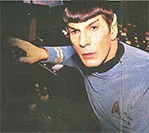AN ICON: Nimoy’s Mr Spock was a role model for humanity and a voice of logic and reason
THIS week, I would like, if I may, to write about something rather different from what I usually write about. Regular readers would know that this writer has focused more on issues of regional politics in the past. The passing of actor Leonard Nimoy has struck a chord with many who grew up in the 1960s-80s, and who are familiar with the TV series, Star Trek. Among the characters of the series, the character that Nimoy played -Mr Spock the scientist was perhaps the most familiar and iconic. For youngsters like myself who were at school then and who were hooked on the series, he was an icon and role model for book-devouring nerds and geeks who en-, joyed the sciences and were fascinated by the charms of modernity.
While tributes to Nimoy the actor have come from all over the world, it is interesting to note that he was, and remains, in the eyes of many the same figure as Mr Spock whom he played. There is, however, one aspect to the character of Spock that particularly deserves mention today, in the context of the troubled times we live in where irrational sectarian violence is rife across the world: Spock was a man of science and in the series Star Trek he was often presented as the contrarian voice to the more emotional Captain Kirk.
Indeed, the legacy of Mr Spock’s character is precisely that: That he was a man of reason, science and cool temper, in contrast to the violent characters that often appeared in the many episodes of the series. We need to place him in the context of the times, and note that Star Trek appeared at the height of the Cold War where fear and animosity on both sides of the iron curtain was also high. At a time when Hollywood TV series often featured men of violence and brutish action, his was perhaps one of the very few characters that constantly professed the opposite: A belief in the power of logic and reason, and the hope that science would uplift the lot of human beings. In contrast to the cowboy and war films being made then, it is astounding that Star Trek became a hit, and the character of Spock a popular hero.
In so many respects the figure of Mr Spock offered an alternative model of masculinity that was in stark contrast to the male stereotype of that age. Eschewing violence and irrationality, his character placed his faith in the ability’ of reason and logic to discover truths and to enlighten the ignorant. In total contrast to the image of the man of violence being popularised elsewhere, his image offered a reversed interpretation of what masculinity could and should be like.
Today, we live in a world where religious and political sectarian violence has led to terror attacks, indiscriminate .killing of civilians and hostages, the burning of libraries and the wanton destruction of relics and monuments of the past. All of this violence has been justified in the name of political ideologies or religions, by people who profess belief in things they may not even understand. If one were to take a snapshot of the age we live in today, one might conclude that we do indeed live in an age of madness and unreason.
Now, more than ever, we need role models and heroes of nonviolent nature who can point to an alternative vision of the future that is more enlightened and tolerant of everyone. Now is the time when the world needs a Spock-like vision of a common humanity united in rational thinking, fair and balanced discourse and objective analysis. Sadly, popular media today has instead fed us with a steady stream of popular nonsense, and no film today would be complete without some monster, alien, zombie, terrorist or murderer on the loose. The passing of Leonard Nimoy was not merely the passing of an actor, but of a character who managed to get a generation to pause and think. Now is when we need such models most, and now is when reason has to be seen as an act of valour.
Article by Dr Farish Noor which appeared in New Straits Times, 2 March 2015.





